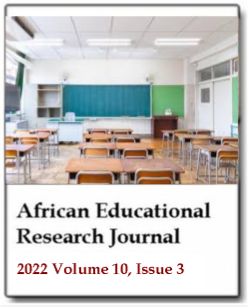Views of education faculty students on emergency remote teaching
Belgin Bal IncebacakAfrican Educational Research Journal
Published: July 14 2022
Volume 227-241
DOI: https://doi.org/10.30918/AERJ.103.22.036
Abstract
This study aims to try to understand in depth what the students studying at the Faculty of Education in the 2020-2021 emergency remote teaching (ERT) period experience during the theoretical and applied courses and their views on distance education. For this purpose, this study was conducted with the phenomenology design, one of the qualitative research designs. The research was conducted with 455 students studying at the Faculty of Education of a state university in the Black Sea region of Turkey. Ethics Committee approval (Number E-45428382-050.99-109541) was first obtained from a State University to collect the study data. The data were collected using the online interview form developed by the researcher. Qualitative data were analyzed by subjecting them to semantic content analysis with content analysis. While the researchers analyzed the data, it was analyzed according to member control, credibility, transferability, and verifiability/confirmability criteria for validity and reliability. In addition, students' opinions were analyzed by Hofstede's descriptive analysis according to their cultural dimensions according to countries. The data obtained from the findings were analyzed in the themes of positive, negative, and solution suggestions in emergency remote teaching. The positive features of distance education are divided into categories under the headings of the courses' teaching, the instructor's attitude, and resource access. The negative features of emergency remote teaching are categorized under the education and training process, communication, technological deficiencies, and personal situation.
Keywords: Emergency remote teaching, faculty of education, student opinion.
Full Text PDFThis article is published under the terms of the Creative Commons Attribution License 4.0

